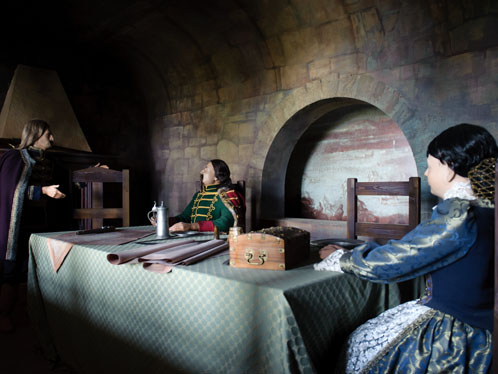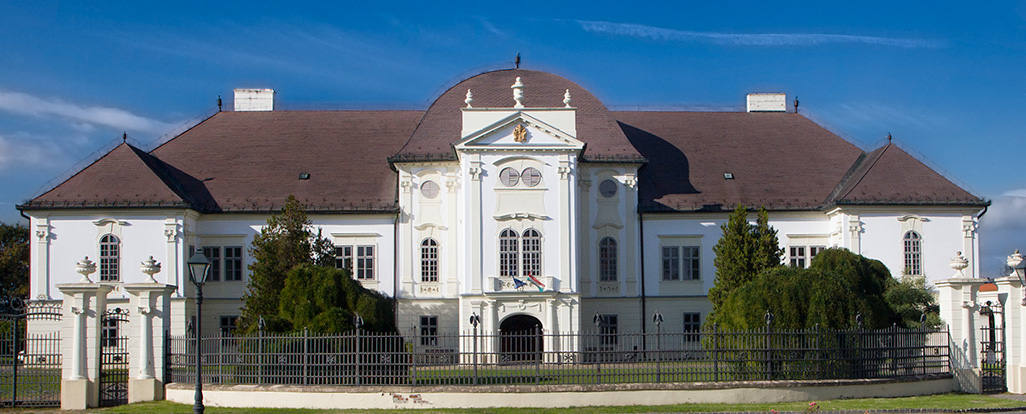Current Exhibitions
The War of Independence (1703-1711) - The State of Rákóczi and the County of Nógrád

A New System in Hungary
After 1541 Nógrád County was a kind of buffer zone ruled by the Turks and the Hungarian alternately. The decrease in the number of the population was not significant in the years of the Turkish rule but it assumed considerable proportions between 1682 and 1687, during the war of liberation.
On 26 January 1699 the three members of the Holy League, Venice, Poland and the Habsburg Empire made peace with the Turkish Empire. The royal Hungarian representatives were not asked to take part in the negotiations. The war council issued a decree on 5 February to dissolve the national army of the Kingdom of Hungary. Imperial garrison troops were stationed in the most important castles and the smaller fortifications were blown up. Some of the soldiers who had defended the castles were drafted into the imperial regiments and others were discharged. The discontent of the county nobility and the masses of the people increased the divisions in society. Former defenders of border castles, outlaws, the poor, peasant soldiers, impoverished gentry and members of lesser nobility longed for changes. Those who felt responsible for the future of the country also supported them.
‘Yielding to Numerical Superiority’
Ferenc Rákóczi II crossed the Hungarian border on 16 June 1703. In the beginning the fights following his return were comparable to the insurrections in the Tokaj region. The nobility in Nógrád County began to unite against the ‘peasant rebels’ after Rákóczi’s victory on 30 July at Tiszabecs. At the meeting they held on 4 September in Gács they were still loyal to the king and made a decision to ask the noblemen and their families to move to the castles of Gács and Kékkő or the market-town of Szécsény. In September and October Rákóczi’s troops took the entire county of Nógrád under their control. The peasants, who were desperate because of the unbearably high taxes, turned against their masters. Apart from the serfs, the citizens of market-towns restricted in their liberty and the lesser nobility also followed Rákóczi’s banner of freedom.
 The landowners, who retreated into their castles and could not expect any help from the outside, were forced to surrender. Nevertheless they did not trust in Rákóczi’s victory and put a solemn declaration into the archives of the Garamszentbenedek Convent stating that they opened their castles to Rákóczi’s troops not voluntarily, but yielding to numerical superiority. After this, at a general assembly in Losonc (today’s Lučenec in Slovakia), the nobility of Nógrád voted to join Rákóczi. Pál Kajali and Pál Ráday took their deed of fidelity to the court of the ruling prince in Tokaj.
The landowners, who retreated into their castles and could not expect any help from the outside, were forced to surrender. Nevertheless they did not trust in Rákóczi’s victory and put a solemn declaration into the archives of the Garamszentbenedek Convent stating that they opened their castles to Rákóczi’s troops not voluntarily, but yielding to numerical superiority. After this, at a general assembly in Losonc (today’s Lučenec in Slovakia), the nobility of Nógrád voted to join Rákóczi. Pál Kajali and Pál Ráday took their deed of fidelity to the court of the ruling prince in Tokaj.
The Szécsény Diet: 12 September – 3 October 1705
During the war against the Habsburgs Rákóczi convened nine Diets in Hungary and Transylvania. The first meeting during the war of independence renewed the confederacy and made its social base wider. Not only the noblemen, rich landowners and free royal towns were in the ‘national covenant of the country’, but also the chivalrous order, citizens of market-towns and the Kun nationalities. Rákóczi was elected ruling prince and a Senate of 24 members was set up to assist him. For managing and controlling national finances a supreme body of finance, the ‘Council of the Exchequer’ was created. By establishing the most important organs of administration the allied orders created the constitution of the state for the fight for freedom in Szécsény. Again, Szécsény was the scene of the creation of the law of religious tolerance, which may have been the first law in the whole world made to protect minorities.
Affairs in connection with religion were also settled in order to make national unity stronger and create the legal foundations for peace negotiations.
The historic legislation that the Diet made in religious questions declared freedom for the three accepted and common forms of religion and also supported the freedom of conscience.
 The Diet was at the centre of international attention and at the same time it was an important stage in the history of the Spanish War of Succession and the Hungarian-Habsburg peace negotiations. For the English the outcome of the Szécsény Diet had an important effect on the balance of European powers.
The Diet was at the centre of international attention and at the same time it was an important stage in the history of the Spanish War of Succession and the Hungarian-Habsburg peace negotiations. For the English the outcome of the Szécsény Diet had an important effect on the balance of European powers.
At this historic event the allied orders decided to open peace negotiations with the Habsburg dynasty. They passed an act to make the peace treaty conditional upon the mediation of England, Holland and other foreign countries.




